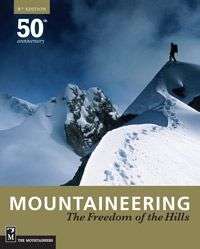Mountaineering: The Freedom of the Hills
Mountaineering: The Freedom of the Hills[1] is often considered the standard textbook for mountaineering and climbing in North America. The book was first published in 1960 by The Mountaineers of Seattle, Washington. The book was written by a team of over 40 experts in the field.

The book grew out of the annual climbing course run since 1935 by the Mountaineers, for which the reading material was originally a combination of European works and lecturers' mimeo outlines. These were assembled into the Climber's Notebook and published by the Mountaineers as the hardbound Mountaineers Handbook in 1948. By 1955 the rapid postwar evolution of climbing techniques and tools had made the Handbook out of date, and the effort was begun to produce Freedom of the Hills. Nearly 80 major contributors are credited in the first edition and were organized by a committee of 8 editors.
The first four editions were only available in hardcover.
Editions
| Edition | Year | Editor(s) | Size | ISBN |
|---|---|---|---|---|
| 1st | 1960 | Harvey Manning | 430 pp. | |
| 2nd | 1967 | Harvey Manning | 485 pp. | |
| 3rd | 1974 | Peggy Ferber | 478 pp. | |
| 4th | 1982 | Ed Peters | 550 pp. | |
| 5th | 1992 | Don Graydon | 447 pp. | ISBN 0-89886-201-9 or ISBN 0-89886-309-0 |
| 6th | 1997 | Don Graydon and Kurt Hanson | 528 pp. | |
| 7th | 2003 | Steven M. Cox and Kris Fulsaas | 575 pp. | ISBN 0-89886-827-0 |
| 8th | 2010 | Ronald C. Eng | 592 pp. | ISBN 978-1-59485-137-7 |
| 9th | 2017 | Eric Linxweiler and Mike Maude | 624 pp. | ISBN 978-1-68051-004-1 |
Chapter list
In the 9th edition, the book is divided into six parts as follows
- Part One: Outdoor Fundamentals
- Part Two: Climbing Fundamentals
- Part Three: Rock Climbing
- Part Four: Snow, Ice, and Alpine Climbing
- Part Five: Leadership, Safety, and Rescue
- Part Six: The Mountain Environment
There is an appendix, a glossary, and an index.
Chapters
- First Steps
- Clothing and Equipment
- Camping, Food, and Water
- Physical Conditioning
- Navigation
- Wilderness Travel
- Leave No Trace
- Access and Stewardship
- Basic Safety System
- Belaying
- Rappelling
- Alpine Rock Climbing Technique
- Rock Protection
- Leading on Rock
- Aid and Big Wall Climbing
- Snow Travel and Climbing
- Avalanche Safety
- Glacier Travel and Crevasse Rescue
- Alpine Ice Climbing
- Waterfall Ice and Mixed Climbing
- Expedition Climbing
- Leadership
- Safety
- First Aid
- Alpine Rescue
- Mountain Geology
- The Cycle of Snow
- Mountain Weather
Origin of title
The title of the book is a reference to the ancient medieval European tradition of "Freedom of the City", that conferred upon the recipient access to a city. The reference implies that with the knowledge in the book, a certain equivalent freedom of the wild mountains can be attained.
References
- The Mountaineers (10 October 2010). Mountaineering: The Freedom of the Hills (50th Anniversary Edition). 8th Ed. Mountaineers Books. ISBN 978-1-59485-137-7.